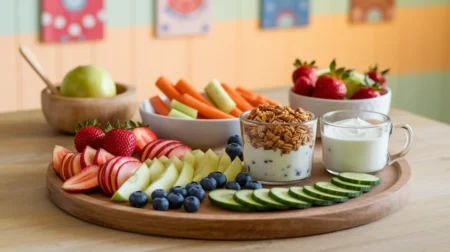Hash browns, with their crispy side and delicious taste, have become a popular choice for breakfast. But are they really a healthy option to start your day? In this article, we will explore the nutritional value of hash browns and whether they can be considered a nutritious addition to your breakfast routine.
Key Takeaways:
- Hash browns can be a tasty addition to your breakfast.
- The nutritional profile of hash browns includes calories, fat, and carbohydrates.
- Hash browns can provide essential vitamins and minerals.
- When consumed in moderation, hash browns can be part of a balanced meal.
- There are healthier ways to enjoy hash browns, such as using alternative cooking methods or incorporating whole grains.
Nutritional Profile of Hash Browns
When considering the nutritional value of hash browns, it’s important to analyze their calorie, fat, carbohydrate, and nutrient content. Hash browns are a popular breakfast option, often enjoyed as a crispy side to complement morning meals.
Let’s take a closer look at the nutritional composition of hash browns:
- Calories: A typical serving of hash browns, which is usually around 150 grams or approximately 1 cup, contains about 210 calories. However, it’s important to note that portion sizes can vary, so be mindful of your specific serving.
- Fat: Hash browns are relatively low in fat compared to some other breakfast foods. The fat content in 1 cup of hash browns is around 10 grams, with most of it coming from plant-based sources.
- Carbohydrates: Hash browns are primarily composed of carbohydrates, providing energy to fuel your morning. In a 1-cup serving, you can expect to consume around 30 grams of carbohydrates.
- Nutrients: While hash browns may not be the most nutrient-dense breakfast option, they do contain some important vitamins and minerals. One serving can provide small amounts of potassium, vitamin C, and magnesium.
In moderation, hash browns can be a part of a balanced meal that includes other nutrient-rich foods.
When it comes to incorporating hash browns into a healthy breakfast, it’s important to consider portion sizes and balance them with other nutritious choices. While hash browns can be enjoyed as part of a well-rounded meal, it’s essential to also include protein-rich foods, whole grains, and fruits or vegetables for added nutritional benefits.
Next, we will explore the potential health benefits of consuming hash browns and discuss the importance of a balanced breakfast.
The Health Benefits of Hash Browns
When it comes to breakfast choices, hash browns can offer more than just a crispy side to complement your morning meal. These golden-brown delights can also provide several health benefits, making them a nutritious addition to your breakfast plate.
Hash browns are rich in essential vitamins and minerals that contribute to a healthy diet. They contain important nutrients such as potassium, magnesium, and vitamin C, which play vital roles in maintaining overall well-being.
Potassium is a mineral that helps regulate blood pressure and supports proper muscle function. It also aids in maintaining a healthy heart and nerve function.
Magnesium is another crucial mineral found in hash browns that contributes to bone health and supports energy metabolism. It also plays a role in the proper functioning of muscles and the nervous system.
Vitamin C, known for its immune-boosting properties, is an antioxidant that helps protect cells from damage, supports collagen production, and enhances iron absorption in the body.
By incorporating hash browns into your breakfast, you can conveniently boost your intake of these essential vitamins and minerals, helping you meet your daily nutritional needs.
“Hash browns are a tasty and convenient option for breakfast. They provide a satisfying crunch while also offering valuable vitamins and minerals that your body needs.”
In addition to their vitamin and mineral content, hash browns can also be a source of complex carbohydrates, providing a steady release of energy throughout the morning. This can help you feel fuller for longer and maintain optimal focus and productivity levels.
While hash browns can be a healthy part of your balanced breakfast, it’s important to remember that moderation is key. Pairing them with other nutritious foods, such as eggs, fruits, or whole grains, can create a well-rounded and satisfying morning meal.
Overall, hash browns can be a delicious and nutritious addition to your breakfast routine. By enjoying them in moderation alongside other nutrient-rich foods, you can start your day off right with a meal that provides a variety of vitamins, minerals, and energy to fuel your day.
Are Hash Browns a Healthy Breakfast Option?
When it comes to breakfast foods, hash browns are a popular choice. However, their high fat content raises questions about whether they can be considered a healthy option for your morning meal. Let’s take a closer look at the nutritional profile of hash browns and evaluate their place in a balanced diet.
It’s important to note that hash browns are typically made by frying grated or shredded potatoes, which contributes to their crispy texture. While frying can enhance the taste and texture of hash browns, it also increases their fat content. One medium-sized hash brown can contain around 8 grams of fat, with a significant portion of it being saturated fat.
Despite their high fat content, enjoying hash browns in moderation can still be part of a healthy breakfast. It’s all about balance and making informed choices. Pairing hash browns with other nutritious elements can help create a balanced meal that provides essential nutrients.
When incorporating hash browns into your breakfast, consider adding lean protein sources such as eggs or turkey bacon to increase satiety and provide a well-rounded mix of macronutrients. Adding vegetables like spinach or tomatoes can boost the fiber and vitamin content of your meal. By combining these elements, you can turn hash browns into part of a nutritious and satisfying breakfast.
To further maximize the healthiness of your hash browns, there are alternative cooking methods to explore. Baking or air frying hash browns can reduce their fat content while still delivering that crispy texture we love. Another option is using avocado oil or canola oil, which are healthier alternatives to traditional frying oils.
Overall, while hash browns do have a high fat content, they can still be enjoyed as part of a healthy breakfast when consumed in moderation and balanced with other nutritious components. By making mindful choices and exploring alternative cooking methods, you can savor the deliciousness of hash browns without compromising your overall well-being.
Hash Browns Nutritional Comparison
| Nutrition | Hash Browns (1 Medium-Sized Portion) | Baked Sweet Potato (1 Medium) | Whole Wheat Toast (1 Slice) |
|---|---|---|---|
| Calories | 180 | 102 | 80 |
| Fat (g) | 8 | 0.2 | 1 |
| Carbohydrates (g) | 21 | 23.6 | 15 |
| Protein (g) | 2 | 2.3 | 3 |
| Fiber (g) | 2 | 3.8 | 2 |
Healthier Ways to Enjoy Hash Browns
While hash browns can be a delicious addition to your breakfast routine, there are ways to make them even healthier. By incorporating whole grain alternatives and opting for healthier cooking methods, you can enjoy the crispy side dish guilt-free. Here are some tips and suggestions:
1. Homemade Hash Browns
One way to ensure your hash browns are healthy is by making them from scratch. By preparing them at home, you can control the ingredients and avoid any added unhealthy additives. Homemade hash browns can be a nutritious option as you can choose to use fresh ingredients and cater to your dietary preferences.
2. Whole Grain Alternatives
Rather than using traditional hash browns made with white potatoes, consider using whole grain alternatives. Sweet potatoes, quinoa, or cauliflower can be excellent substitutes. These options provide additional nutrients and can boost the overall nutritional value of your breakfast.
3. Healthier Cooking Methods
Instead of frying hash browns in oil, try healthier cooking methods such as baking or air frying. These methods require less oil and help reduce the overall fat content while still achieving a crispy texture. In addition, using heart-healthy oils like avocado oil or canola oil can be a healthier alternative to traditional frying oils.
4. Serve with Nutritious Toppings
Make your hash browns even more nutritious by topping them with healthy ingredients. Consider adding sliced avocado or fresh herbs for added flavor and nutrients. You can also pair them with a protein-rich food like Greek yogurt or add a side of fruit for a well-rounded breakfast.
Tip: Hash browns can be a versatile breakfast option. You can add vegetables like bell peppers, onions, or spinach to increase the fiber and vitamin content. Don’t be afraid to experiment and customize your hash browns based on your preferences and dietary needs.
By incorporating these healthier alternatives, you can still enjoy the deliciousness of hash browns while making them a nutritious addition to your breakfast. Remember, moderation and balance are key when it comes to creating a healthy meal.
Other Breakfast Choices to Consider
When it comes to starting your day off right, there are plenty of delicious and nutritious breakfast choices to consider. Diversifying your morning meals can help keep boredom at bay and ensure you’re getting a variety of essential nutrients. Here are some alternatives to consider:
Pancakes and Waffles
If you have a sweet tooth, pancakes and waffles can be a satisfying breakfast option. Opt for whole grain varieties and top them with fresh fruit or a drizzle of real maple syrup for added nutritional benefits.
Cereal
Cereal can be a convenient and quick choice for busy mornings. Look for options that are low in sugar and high in fiber to keep you feeling full and satisfied. Consider adding a scoop of protein-rich Greek yogurt or a splash of nut milk for added nutrition.
Protein-rich Greek Yogurt
Greek yogurt is packed with protein, making it an excellent choice for breakfast. Top it with your favorite fruits, nuts, or granola for added flavor and texture.
Fruit Juice
A refreshing glass of fruit juice can provide a burst of vitamins and minerals to start your day. Opt for 100% fruit juice without added sugar or additives. Remember to enjoy it in moderation due to its natural sugar content.
Nut Butter
Spread some nut butter on whole grain toast or add it to your smoothie for a boost of healthy fats and protein. Look for natural nut butters without added sugars or hydrogenated oils.
A Balanced Breakfast
The key to a healthy breakfast is balance. Aim to include a mix of protein-rich foods, whole grains, and healthy fats to keep you energized and satisfied throughout the morning. Here’s an example of a balanced breakfast:
| Food | Amount |
|---|---|
| Scrambled eggs | 2 eggs |
| Whole grain toast | 1 slice |
| Fresh fruit | 1 cup |
| Avocado | 1/4 medium |
By considering these breakfast choices and focusing on a balanced meal, you can start your day with a nutritious and satisfying meal that sets the tone for a healthy lifestyle.
Moderation and Balanced Eating Habits
When it comes to making healthy breakfast choices, moderation and balanced eating habits are key. The way we fuel our bodies in the morning sets the tone for the rest of the day, so it’s important to opt for nutritious options that provide sustained energy and support our overall well-being.
Processed foods and those with added sugars can have negative effects on our health when consumed in excess. These foods often lack essential nutrients and can contribute to weight gain, inflammation, and various chronic diseases. To prioritize your health, try to minimize processed foods and added sugars in your breakfast routine.
Instead, focus on incorporating unprocessed, whole foods into your morning meal. These foods are minimally refined and retain their natural nutrients, providing you with a wide range of vitamins, minerals, and antioxidants. By choosing unprocessed options, you can nourish your body with the wholesome goodness it craves.
“The key to a healthy breakfast is moderation and balance. Avoid processed foods and added sugars, and choose unprocessed, whole foods for optimal nutrition and well-being.”
Creating a balanced meal is also important. Aim to include a mix of nutrients in your breakfast, such as complex carbohydrates, protein, healthy fats, and fiber. This combination helps stabilize blood sugar levels, keeps you feeling fuller for longer, and provides sustained energy throughout the morning.
Here’s an example of a balanced breakfast plate:
| Food Group | Examples |
|---|---|
| Complex Carbohydrates | Whole grain toast or oatmeal |
| Protein | Eggs or Greek yogurt |
| Healthy Fats | Avocado or nut butter |
| Fiber | Fruits or vegetables |
By following these principles of moderation and balanced eating, you can create a breakfast that not only tastes delicious but also nourishes your body and sets you up for success throughout the day. Remember, each meal is an opportunity to nourish yourself and make choices that support your overall health and well-being.
Conclusion
After examining the nutritional profile and health benefits of hash browns, it can be concluded that they can be a part of a healthy breakfast when consumed in moderation.
Hash browns, known for their crispy and satisfying texture, can provide a nutritious start to your day. They contain essential vitamins and minerals such as potassium, magnesium, and vitamin C, which contribute to overall health and well-being.
However, it is important to note that hash browns should be enjoyed as part of a balanced meal that includes other nutritious components. Pairing them with protein-rich sources like Greek yogurt, incorporating whole grains, and adding fruits can enhance the nutritional value of your breakfast.
Ultimately, the key to a healthy breakfast is moderation and mindful food choices. While hash browns can be enjoyed occasionally, it’s crucial to maintain a balanced eating habit and limit the consumption of processed foods and added sugars. Opting for unprocessed, whole foods is always a better choice for your overall health.
FAQ
Are hash browns a nutritious breakfast option?
While hash browns can be a crispy and delicious side for breakfast, their nutritional value might be limited. They are high in calories, carbohydrates, and fat, and often lack important vitamins and minerals. However, if consumed in moderation as part of a balanced breakfast, they can still be enjoyed.
Can hash browns be considered a healthy breakfast choice?
Hash browns aren’t the healthiest breakfast option due to their high fat content and lack of significant nutritional value. However, when consumed in moderation as part of a balanced meal, they can still be enjoyed as an occasional treat.
How can I make hash browns healthier?
You can make hash browns healthier by preparing them at home using whole-grain potatoes and cooking them with avocado oil or canola oil instead of deep-frying. This reduces their fat content and adds some healthier fats to the dish.
What are some other breakfast choices I can consider?
There are plenty of healthier breakfast options to consider, such as pancakes and waffles made with whole-grain flour, protein-rich Greek yogurt topped with fruits, nut butter on whole-grain toast, or a bowl of cereal with unsweetened almond milk. These options provide a more balanced and nutritious start to your day.
How important is moderation in breakfast choices?
Moderation is key when it comes to breakfast choices. It’s important to control portion sizes and not rely solely on processed foods that are often high in added sugars and low in nutritional value. Opting for unprocessed, whole foods and balancing macronutrients (carbohydrates, protein, and healthy fats) is essential for maintaining a healthy diet.











